Tuesday, March 30, 2004
Thank you so much to everyone who has sent good wishes to us and to our friends. She is on the mend, and everyone is getting some much-needed rest. I have a lot to write about, but it looks like that will have to wait until after we are back home.
Tomorrow, if all goes well, a brief blogger rendezvous.
9:55 PM
|
Monday, March 29, 2004
I'm back in New York. A very close friend of ours had surgery for breast cancer on Friday, and on Saturday her elderly mother died. So needless to say, it has been a very difficult situation, and we came down to help out. I'm glad we did. Things seem much better today, everyone got some sleep, our friend is back home and her husband and daughter are feeling better. It's a gorgeous day here, too - we're in the Village, close to Washington Square, and the morning light is shining on the buildings and streaming into the apartment. Lots of love here too.
More later...
10:05 AM
|
Saturday, March 27, 2004
 MY THERAPY MY THERAPY
Singing has to be so good for you. In London on vacation I sometimes went to church at St. George's Bloomsbury, a historic, rather square Nicholas Hawksmoor structure now hemmed in by the neighboring buildings and very much in need of the restoration work that has recently commenced. It's an (hush!) Anglo-Catholic parish with a good organ, some of the finest plasterwork in London (also in need of restoration), a very formal liturgy, and a small local congregation who are responsible for maintaining their building. I was there on several Christmas mornings, leaving the hotel when I heard the bells tolling a quarter hour before the service, freezing during it with my feet on the cold stone floor, and lingering afterwards for mince pies and mulled wine.
St. George's doesn't have a choir, or didn't then, but they had an excellent organist and a woman soloist with a fine voice who served as cantor. During one of my visits I went up to the organ loft afterwards to say hello to the musicians, who were glad to talk to an American singer-visitor. Joyce, the cantor, told me she also gave singing lessons to war victims. It turned out that she meant men who had been wounded or gassed in World War II, and had breathing problems as a result. "So I have them sing," she said. "Some are in wheelchairs. It's so good for them, good for their lungs, and good for the whole body and spirit." What a practical British solution, I thought, betting this sturdy, down-to-earth woman was very good at it. I doubt we'd think of that here.
Often on mornings like today, when I'm in an intense choir rehearsal, breathing deeply and singing with my whole body, next to my friend Anne who is doing the same, I think of Joyce and her students. Having done this my entire life, I know she's right: it's therapy to sing, and privilege, and hard work, and often sheer joy. (DO try this at home the next time you feel sad: turn up a favorite CD, and belt it out!)
3:58 PM
|
Friday, March 26, 2004

MOVE OVER, CALIFORNIA!
Spring is springing even in New England. (The rest of the landscape today is mostly mud.)
. . . . .
Last weekend I finished the first novel in Anatoly Rybakov's trilogy about life in Russia under Stalin, "The Children of Arbat". The always-astute Language Hat observed that Rybakov's work may be "more worthy than artistic" and now that I've read one volume, I'd have to agree. However, it WAS worth it to me to read this account, which must be largely autobiographical, of a young man's falling out of favor with the Party, his exile to Siberia, and life among the rough peasants and petty bureaucrats where no one could be trusted. Meanwhile, back in Moscow, his group of male and female friends begin their post-school lives.
What fascinated me were (not surprisingly, I guess) the struggles of people living under impossible situations to maintain their humanity, dignity, and sense of enjoyment of life; their desire for relationships; their varying degrees of integrity; their attempts to circumvent and manipulate a corrupt system to their own benefit; and their interpretations of what is moral behavior. Halfway through the 650 pages I said, "No way am I going to read the rest of these," but when I finished (at a rather fast, ignore-the-subtleties clip, I admit) I was wavering. We'll see. The writing really is not artistic; there wasn't a single phrase that was memorable or quotable, but I will remember the characters and their lives and I find myself wanting to know what happened to them. The authenticity comes through.
2:30 PM
|
Thursday, March 25, 2004
My eyes are burning from a day glued to the screen. We've got a five-hour interview with the Bishop tomorrow, and I'm trying to prepare not only the questions but a redundant digital recording system. Working with sound is new for me, after years and years of visual work. I find I like it - maybe it's the music thing coming out in a different form - but it presents new technological challenges and there's a lot to learn. Today I was testing three different types of microphones and setting up profiles to avoid clipping and capture the best quality recording. Then there is the editing part...interesting, frustrating. I lost an entire hour and a half of work inserting text markers into a sound file because I didn't save it correctly, for example. Well - I won't make the same mistake again!
If anyone has questions they'd like me to ask Bishop Robinson, I'd love to hear from you. I expect to be talking to him a lot over the next few months, and your input could make this a stronger project with much broader appeal. What's interesting to you: Episcopalians or not, believers or not, astute social critics all? What sort of topics would make you want to read a book about him? Feel free to comment here or to send me e-mails.
. . . . .
Tonight, though, it's Bach. We're singing Cantatas 131 (Out of the Deep) and 118 (Jesu Christ, My Lord and Life) on Sunday evening and are NOWHERE NEAR ready with #131, although I bet it will come together tonight. It's going to be a workout, especially for the tenors and basses who have a complex cello-like running line in two of the movements. We sopranos have it easy, just getting to sing the chorale over them. Our director explained that this work is "Baby Bach" - J.S. when he was only 25 years old. He wrote it (like much of his vocal music) very instrumentally, i.e. using voices as substitutes for instruments. Well and good for musicality and overall effect, but hell if you're a soprano trying to sing a violin line, or a bass trying to be a cello. Still, there is nothing like working on Bach, and few things in life are as satisfying as the moments when all the difficulties begin to smooth out, and the music emerges in all its beauty and power.
4:49 PM
|
Wednesday, March 24, 2004
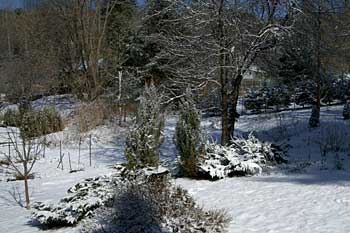
NEW SNOW
Well, I can't deny that it's pretty!
. . . . .
There's a miniature rose bush in my window, next to the basil growing strongly under plastic. The roses are yellow, and tiny, and they make me happy every time I look at them. It's sunny today, and in spite of the new snow I feel more cheerful than I have lately. Yesterday was a grim day, one of those where I felt like I was losing my equilibrium completely and falling into the abyss of gloom and self-pity. Roaming the blogosphere, I know I'm not alone in this; the assassination of Sheik Yassin seems to have pushed a number of us over the edge. (It's made for some good posts though - dale's recent one on anger in particular.)
Yesterday was also the day when I sent out reminders for our monthly interfaith prayers for peace. I wrote something about how it was important to gather and to support each other right now, and got back a note from one of my Muslim friends, who is the prayer leader for the local Muslim community. "Please do not be sad over the world situation," he wrote. "Remember that God is able to change it at any moment, remember that it is all a test to see who are the righteous and who are the unjust people."
I was touched by his concern for me, even though I find it hard to believe the same way. I'd like to, because I want to believe that there will be a reckoning someday, and that the perpetrators of violence and destruction -- those who are unjust, greedy, and those who misuse power, will be held accountable. I want to believe that there is such a thing as justice. And all our religious systems seem to have some sort of ultimate justice or balancing system built into them, whether it is karma or a Day of Judgement. (I also recognize in myself that this desire to explain the inherent unfairness of life is utterly human, and if carried to an extreme can be, in itself, vengeful).
What I find most useful in my friend's view, and that of other Muslims I know, is the underlying thought that obstacles and suffering are challenges, and that what matters is our response to them. I can lose myself in anger or despair, or I can pick myself up, again and again, and try to understand, grow; be a loving, hopeful, and grateful person despite a chaotic and painful world.
Some days, it's the hardest possible thing. It's "lack of control" that usually sets my own spiral into motion. I can't change the government by myself, can't turn back the clock, can't take away pain, death, loss, and fear even from those I love the most. But what I can do is love harder and more fully - both others, and myself. I can be grateful for the freedom to still use my pen and my voice, but I can also notice the roses, plays some music, make some food and share it. I can refuse to be terrorized and hopeless-ized into losing my own humanity.
Other peoples, who have lived with suffering, hardship, and lack of control a lot longer than we have, in the quick-fix-it West, are much better at this. I think of Rosewicz's "Old Women", just doing (there it is again!) what needs to be done. Or this stanza from Zbigniew Herbert's "The Ardennes Forest":
push away leaves: a wild strawberry
dew on a leaf the comb of grass
further a wing of a yellow damselfly
and an ant burying its sister
a wild pear sweetly ripens
above the treacheries of belladonnas
without waiting for greater rewards
sit under the tree
. . . . .
(A note to Ernesto of Nearly Neutral, I'd like to write to you or comment but there's no email address...?)
10:13 AM
|
Monday, March 22, 2004
CONFESSION
I pulled out my folder of the Village Poems and went through them all - there were 29 of them, written in 1997 and 1998. I'd marked 16 as being "OK", 3 to be cut, 10 in need of editing, and that was just about right, except that the 16 are OK and the other 13 need to be deleted, not edited. They did "lack artistic merit" - although most of those dogs hadn't gotten sent in with my ill-fated grant application.
It's so good to go back to old work and see it afresh, because not only do you see what was wrong, a lot of the time, you also see yourself with new eyes. I was sort of shocked at how truly lousy the bad poems were, and even more so that I could have thought they were salvageable at the time. But there were others that I liked then, and still like now, and a few that were just asking for a little love and attention. They made me recall a particualr time and frame of mind, like looking through old snapshots. I had thought maybe I'd write some more of these, now, but I don't think I can or should - what I wrote now wouldn't fit, and these poems form a group and a moment in time, both mine and the village's. There's something that feels true about them still. In a recent comment, Dave wrote how he wished there was more emphasis on collections and groups of poems, and I agree with him. They often tell us more than the one individual poem, because poetry flows out in the context of a life. Re-reading a lot of Akhmatova lately, from different periods of her life, has reinforced that conviction for me.
Today was very cold with a stiff wind, and when I went for a mid-afternoon walk I saw and felt the same things I had written about in this poem seven years ago:
Plate Glass Window, Facing South
On a six-degree day
when the wind
scouring Main Street
sets my shoulder against the storefronts,
I look into Denise’s window
and there
a spray of orchids
looks back at me --
each an extravagance
of white-est ruffles round a crimson throat,
tilting their heads
this way and that --
a cloud of schoolgirls
from a place where live oaks grow,
and people eat black beans
and sit in jazz clubs,
listening to a woman singing stories,
moving her dark bare arms
languidly
against the night.
2/20/97
9:06 PM
|
Sunday, March 21, 2004
I'm blushing here from all the lovely things people said while wishing Cassandra a happy blogday. Thank you, and thank you for reading what I write, and coming back again. I still think it's crazy and amazing that anybody does, and that blogging is one of the best things I've ever decided to do.
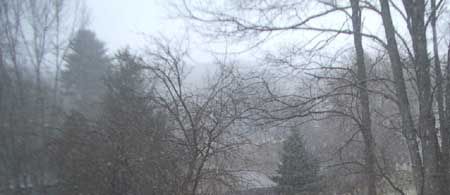
SNOW SQUALL, 4:45 pm.
Now, back to serious stuff, and the quote from Friday.
I sort of wish the author had left it with "Do!" rather than "Do more." The point, I think (and the reason the quote struck me) is that we all have so many excuses for not doing the work: meaning the writing, the paintings, the music, learning the langauges... whatever. So help me God, I have written more in the past about why I wasn't creating than about any other subject. I know what is meant by not-doing, the excuses are all there in my own handwriting, and I also know what it feels like to want to create not just one good piece of writing, but a body of work that represents this one human life. And there's only one way through that, and it's to buckle down and work, write something every day, for yourself, because it matters to YOU.
Part of it is the mileage that you have to put in to hone the craft. Part of it is gradually finding a voice, and learning how to hear the sounds that don't ring true. Part of it is figuring out what you really want to write about, confronting what's really inside. Those processes never end. But there is also a point when it comes back to not-doing - letting go. The few times I've really been in a different zone, where the work flowed effortlessly, almost as if somebody else were guiding it - those times are when I've let go and wasn't thinking too much, although it's not like thought totally stopped. You prepare and prepare, and then once in a while, you get to let go and let it flow through you. The watching "You" simply steps aside. Can't describe it. Others have tried. But all agree that you can't get there without practice, and you can't "will" it to happen again.
Of course we have to think about our work, and of course we have to practice, and of course we have to stop and contemplate, and to simplify our lives so that we have a chance of focusing. Constant "doing" isn't the point. But we'll never get anywhere if we don't DO.
The paradox is that the DOING is often more important that what is done. Still, I'm willing to stick my neck out and say that the poem, the painting, the novel, the composition - these are worthy goals. It sometimes seems that the new political correctness in the blogworld is to say that "process" is more important than anything else when in fact we are trying to avoid our own non-doing, or our fear of failure, and trying to appear non-competitive or non-accomplishment-oriented. The fact is that many of us want very much to write, and to write as well as we can. And we have advantages many writers through history have never had - a medium that encourages daily practice and experimentation, and offers feedback and friendship. Seems pretty lucky to me.
10:45 PM
|
Saturday, March 20, 2004
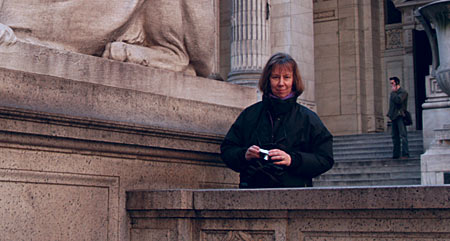
IT'S CASSANDRA'S BLOGDAY
...and she wanted to thank you all for a wonderful first year.
4:34 PM
|
Friday, March 19, 2004
"The problem is never what you are lacking. Label it time or money or equipment or patience or even sanity. Label it whatever you wish, but these are not your problems. Your problem is not doing. Some of the world's greatest masterpieces were done by the broke, the insane, the overworked, the bored. The only difference between you and them is they did it while you only think and talk about it. Do more."
-danklife (via whiskeyriver)
9:24 PM
|
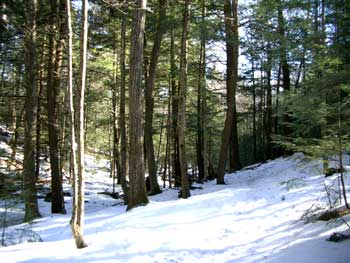
LATE WINTER WOODS (a photo from last week)
The forty degrees today looked warmer than they were when I ventured out for an early-afternoon walk. It's still grey and bleak; the time of year when people start going bonkers in earnest. But they must be doing it indoors; I was the only person out on the village streets except for a tall girl shuffling slowly ahead of me. She had dark uncombed hair, pretty and straight, falling down her back over a bright yellow parka, and she wore long jeans wet at the bottom from being dragged along the street, and heavy black shoes. I caught up to her at the end of my block while listening to the flock of redwing blackbirds in the trees. "Hi," I said, smiling and sneaking a quick glance at her face as I went past. I had expected -what? - a sullen teenager with the dull-eyed, defeated look so common in this town of poor families and early dead-ends. But she smiled back at me with bright eyes, if a little sad, behind wire-rimmed glasses. "Pick your feet up, girl!" I wanted to say. "Come on, let's go look at the beaver dam!"
What was bugging her, I wondered. And why wasn't she in school? Over twenty-five years we've witnessed so many tragedies among the kids of the village - bright, attractive kids who ended up pregnant, married and parenting too young, penniless, tough, defeated. There was one suicide, several prison sentences, too many early pregnancies to count. Some of the kids are here only for a year or two, visiting a parent after a divorce. Others are kids we've known from stroller to bike to first hot-rod. We give them candy on Halloween, buy calendars and gift-wrap and popcorn for their school projects, give an odd job now and then -- and see them in the supermarket, years later: still the same bright glance, the happiness at being recognized even though they get silent and downcast the minute you ask how they're doing. And then there are some who escape, who by sheer force of will or luck or talent get a chance to do something else. I wanted that for this girl, a stranger I'd never seen here before. Who was she?
I crossed the street and went halfway out the bridge over the river. The water had receded enough to reveal the beaver dam again; I couldn't see any evidence of post-winter repairs, and water was streaming over at a fairly good clip, but the basic structure was still holding firm. I watched for a while, hoping to see some movement, but there was none today, just a pair of mallards lazily enjoying the calmer water behind the dam. I glanced back at the street, hoping the girl might be curious enough to be watching. No sign of her. So I went on down to the post office through the road salt and muck on the sidewalk-less side of the road, sorted the mail, and headed back up the hill. There she was, coming back around the block from the other direction. She looked up and smiled again, and I listened to her feet shuffle into the distance. Next time, I told myself. Next time I'll have a little opening, and can say something. They're like wild animals, these kids. You have to go slow, and pray there will be a little bit of time.
. . .
As I was walking, even before I saw her, I was thinking about a series of poems I wrote about this village several years ago. They were simple poems, using plain language, and I wrote them to try to tell people that they, and this place, were just as worthy as any other place on earth. I applied for a state arts council grant to publish them and give a few readings, and I got turned down. The poems "lacked artistic merit", I was told. At the time, that made me mad - who the hell was that board of academic judges to say that to anyone? - but it also hurt, and I put the poems into a folder and never did anything with them except read some at a reading, once, where people picked them out as their favorites of the night. I believe in simple poetry - which Chinese poet used to read his poems to his cook, and if she couldn't understand them, he threw them out? - and I believe in the power of art to lift people up and make them see their worthiness. So I was thinking about getting the poems out and publishing a chapbook, and just leaving a stack of them in the post office. Maybe I need to write one more poem before I do that, and hand a copy to that girl.
4:11 PM
|
Thursday, March 18, 2004

4:53 PM
|
I've spent much of the day researching the money trail that finances the Christian Ultra-Right. I started out to track the funding for the AAC, the conservative Anglican group that opposes gay marriage and gay ordinations. But the trail also leads to highly-funded, long-standing efforts to eradicate Darwin from school curricula, stir up extreme homophobia, influence elections through voting-machine technology, and, of course, affect US governmental policy. It was fascinating, but I found the characters extremely unsavory, and the connections between individuals and organizations way more complex than I had thought. Thank God these ReCons (Reconstructionists) are more marginalized so far than the NeoCons. Still, their influence is widespread and well established within this administration - a major reason, in my opinion, for immediate change.
But the snow is melting - YEAH! - and I'm glad I get to go sing Bach tonight.
Here are some unrelated but interesting links from elsewhere:
HAY FEVER IN JAPAN
Butuki writes about spring pollen and sneezing in Japanese.
PRIDE AND PREJUDICE
Maureen Dowd on Pride and Prejudice, Kerry/Bush style.
Interesting for the science as well as the history:
Teeth Unravel Anglo-Saxon Legacy (BBC).
Researchers ...looked at different types of the elements strontium and oxygen in the teeth of 24 skeletons from an early Anglo-Saxon cemetery at West Heslerton, North Yorkshire that spans the fifth to the seventh centuries AD.
These types, or isotopes, of oxygen in local drinking water vary across Europe and locally within the British Isles.
...This characteristic isotope composition gets set in people's teeth before they are 12 years of age, and can therefore be used by scientists to pinpoint a person's geographical origin.
3:25 PM
|
Wednesday, March 17, 2004
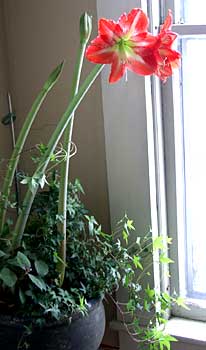
Lunch with my father-in-law today. Snow. In the dining room of the retirement home, we sit down over bowls of chicken gumbo soup, salad, plates of chipped beef on toast. I hear the elderly women talking about their green sweaters, green socks, green pants. "My great-great-grandfather was Irish," I hear one woman tell the young hostess. The artificiality and forced cheeriness of the holiday depress me, but I try to shake it off. This is a day when my father-in-law can't hear; we repeat everything three times, trying different versions of the same thought hoping he'll be able to pick up some key words and get the gist of what we're saying. When he hasn't heard something, he just says, "Yes."
"Is it St. Patrick's Day today?" I ask.
"I wouldn't know," he says, tucking into his soup. He has taken a big bowl of soup, chipped beef, and a plate of watermelon.
"What do you think of Kerry?"
"He's all right. He's saying the right things."
We're silent, trying to think of things to shout at each other.
"See that woman over there?" he says. "She's the richest one here. And she's moving out. She decided to move into an apartment in town."
"Does she have care-givers who will live-in with her?"
He shrugs. "For the rich, it's not a problem."
"There's a hint of bamia in this soup," he says. "What's bamia?"
"Okra," I tell him.
"Yes," he nods.
When we're finished, we head for the front door and see three green balloons, all different, tied together with shiny ribbon. "Someone is having a birthday," my father-in-law remarks.
"I think it's for St. Patrick's Day," I tell him.
"Oh," he says, indifferent. "I wouldn't know."
. . .
Back at home, the afternoon light is brilliant off the new snow; my eyes tear up and sting. I put my hand under the plastic that covers the basil seedlings on the windowsill; it's hot under there, moist. The rosemary tendrils lean toward the light. Oranges, limes, the cobalt blue napkins, the warm old dyes in the carpet all struggle against the pull of the white-washing light. I feel the room tipping toward the window -- floor, walls -- sliding southward toward the light, toward the dazzling death-throes of winter.
I retreat to the couch and a volume of Zbigniew Herbert:
the women on our street
were plain and good
they patiently carried from the markets
baskets of nourishing vegetables
"There was an article about Beirut in the Times," my father-in-law had announced this noon. "Terrible. Just like before. The rich are living like kings, and the poor like dogs. Eventually, there will be another revolution." He shakes his head, and then remembers something. "In Damascus there were people we called the Basket People. You found them in the markets. They wore baskets, you know, two of them with a yoke around their necks. You'd buy whatever you wanted and put it into the baskets, and then for a few coins they would carry it wherever you wanted them to go - all the way across the city. One of them carried my piano once. Imagine someone in this country carrying a piano on his back! But they would just pick up anything, get it settled on their back and ..." he waved his hand, sending the remembered peasant off on his task. "Their legs were really powerful."
"Who were they?" we asked. "Were they Muslims?"
"I don't know," he said. "They certainly weren't Christians. Probably Muslims. They were the poorest of the poor. I didn't know them. I knew only that they were... useful."
the city stands over water
smooth as the memory of a mirror
it reflects in the water from the bottom
and flies to a high star
where a distant fire is burning
like a page of the Iliad
(quotes from Zbigniew Herbert's "Three Poems by Heart" from Elegy for the Departure.)
8:16 PM
|
Tuesday, March 16, 2004
PLEASE VISIT
CommonBeauty's letter-invitational on The Archaeology of Childhood:Injury ends today, with letters from qB, yours truly, and CB.
Meanwhile, we are waiting for a late winter storm to hit: 6-9 inches of snow predicted. The entire day has been silent, grey, and empty. Before a rain, or a midwinter storm, there is silence, and a sort of excited, pregnant suspension, but not this sense of emptiness - of all the air being sucked out of the world. What is it - the change in pressure? I wonder about the physicality of reacting to natural phenomena, because I sense that our bodies have lost the ability to translate the signals we receive, unlke the birds and squirrels. Instead, I find myself doing a mental inventory - eggs? milk? bread? rice? - and once I satisfy myself that our food stores are sufficient, settling in to wait.
6:59 PM
|
Monday, March 15, 2004
ECOTONE TOPIC for March 15: SPIDERS
Charlotte probably gets the credit for making me into a spider protectress. I read E.B. White’s classic at an early age and have ever afterwards identified all spiders with the heroine of that book. My mother, though, was their advocate in real life. She taught me to be a friend of all creatures, and showed me that they all have their place. “It’s more scared of you than you are of it” was the way I was introduced to snakes, snapping turtles, spiders, and even wasps and bees. “Let’s just be quiet and watch it for a little while.” As a result I don’t remember ever being especially afraid of anything I found in nature; in fact I was surprised and affronted the first time a bee stung me. I learned to be respectful, yes; but scared, no.
We lived in a rambling old house with a large spider-harboring attic and spider-friendly gardens; I often woke to a lawn covered with dew-studded “fairy” webs. In the summers we went to our unfinished camp on the lake where for years we were mere visitors amid the fauna who really lived there. Our lake house always had spiders in it. They were mainly allowed to stay put, in the bathroom or the damp downstairs, or were escorted gently outside. That’s my policy today, too – we’ve had a resident spider (or its progency) in the bathroom for years, and my often-unused studio has many more, their egg-cases hanging in the corners. I don’t remember most of these spiders as individuals, but there’s one who remains stickily in my mind.
She – let’s say it was a she – lived under the dock. This was cohabitation, when I was eight or nine, because I lived on top. The dock was long, maybe fifteen feet, and six sturdy feet wide, and it stretched out into the lake from the shore, supported by several posts sunk into the lake bottom. The water at the end was well over my head, so diving and jumping were safe, and there was sun on that end nearly all day long. It was a fine place to fish, worm-can at one’s side; or to play with dolls, or sunbathe with a book, and later in my adolescence it was a place for solitude and daydreaming, or lying on my back at night, gazing at the stars.
But when the sun baked down on the dock, midday, all you had to do was swing your head over the far edge to find yourself eye-to-eye with the other inhabitant: an enormous black spider with hairy legs that would go scurrying through a crack into the darkness beneath the dock. She rarely came up onto the top surface, and although all the kids who swam there knew about the spider and had varying degrees of, shall we say, familiarity with her, no one deliberately splashed her or tried to knock her into the water. That seems strange to me now; maybe we knew the adults would have been angry at us. But perhaps she was preserved because she did scare us a little, and provided part of our fun.
Almost every time we swam, one ritual was to dive underneath the old metal barrels that supported the far end of the dock, and come up into the small dark place underneath. There was two feet of headroom in which to breathe, and another foot on either side of one’s shoulders, but it was quite dark, with a little light filtering in through the cracks in the decking and between the barrels, and the water was always still. That was an advantage, because it meant you could see very clearly all the way to the bottom. Small fish frequented this place too, moving their blue-tipped fins slowly in the water. And – there was always the spider. Finding her was the challenge of going under the dock, and while you were there, treading water and looking around for a glimpse of her hairy legs, a sunfish or rock bass was likely to come up behind you and take a nip of your tender, pale, young back. We worried about eels – although I only saw one there in all those years – and snapping turtles, who kept their distance. So in reality, it was just the spider: slightly menacing; annoyed but not enough to relinquish her territory;, an adult-substitute of sorts in this child-world where we were utterly free; a reliable constant from season to season.
“I see her!” we’d announce, and, mission completed, swim back out into the light.
Read other stories of spiders and place at the Ecotone Wiki.
4:41 PM
|
Sunday, March 14, 2004
PLEASE GO VISIT
...CommonBeauty's series of letter exchanges about childhood which continue today. I'm the second guest, writing a response to Tom of The Middlewesterner about growing up in farm country and about a childhood injury.
AND A THANK YOU
...to everybody who wrote and surprised me with comments on yesterday's poem. It's an experiment for me to post poetry, which I haven't been writing at all lately. I'm much more confident in my prose, probably because I've shared it much more. This poem was several years old and I was very curious if it would meet with silence or comments. So thank you, maybe this will spur me on to write and post some more (sometimes I think I only write poetry when I'm unhappy, so a different impetus would be good!)
2:54 PM
|
Friday, March 12, 2004
Persephone Inspecting the Garden
One month ago, she ate
the last of the pomegranate seeds
on the way back from a trip to the compost bin.
Snow covered her path
and the orange peels and eggshells
lay frozen together on their bed of winter greens,
but still she sensed a stirring underfoot
and a warm, liquid rising in the tall willow
as if to a shy face still unaware of its beauty.
Today, thin emerald blades of chives
sprout brushlike, from bare earth;
pale prepubescent nubs of rhubarb
push forth, prepare to blush.
Kneeling down, she pulls the golden coverlet of straw
from autumn’s last chrysanthemums,
plunges fingers in the soft dark earth,
feeling for the living stems.
Bending close, she listens
in that space between the growing thing and earth,
hears her mother’s voice.
3/31/98
7:52 PM
|
Thursday, March 11, 2004
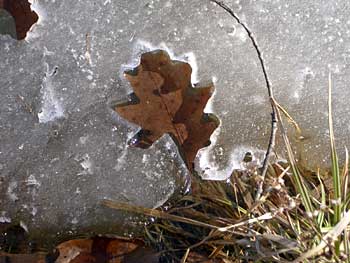
The season changed today. No doubt there will be more snow, thick and heavy, demoralizing but fleeting, but today's sun and warmth - hot enough to feel here on my face as I type five feet away from the window and penetrating enough to send cobalt blue rays from the tulip-vase across the sugar bowl with its blue-tinged cubes, across the teapot, and onto my hand - have sent the snow into alarmed retreat and urged the first green shoots out of the frozen earth. I am euphoric.
Yesterday afternoon I went for a walk in the hilly woods nearby. "How was it," asked J. when I got back. "Nice, a little icy - but so dark!" I told him. He smiled. "That's your refrain these days," he said. "I should set up some lights and shine them on you." I smiled, wanly: "They have to be daylight lights." But today -- today dawned clear and bright, with the promise of real warmth. When J. came bringing me coffee - my eyes still tightly closed - I heard the swish of ski pants. "Ah!" I said, jumping out of bed. "Good for you!" "Can't resist," he replied. Shortly after he left we had a major power outage, caused by a squirrel, probably, scampering around the transformer on the pole outside the house. I conferred with my neighbor and stood outside with him for a while until the power company truck came, both of us relishing the rays of unfamiliar early-morning heat. "We have March sun in Iceland," he told me, "but it never warms you like this. It's just too... far away." Later I read and wrote, worked on my book-making project, made a light lunch, and then went back to the woods for another walk.
Today the woods were bright and airy, shot full of yellow light falling on moss-covered stumps and old stone walls and casting deep blue shadows on the receding snow. The path up the hill was treacherous so I climbed up through the trees, past a flock of lichens alighting like white butterflies on a decaying trunk; piles of deer scat in a stand of Christmas ferns; a fallen white birch, peeling pink and gold. The little brook sang, tinkling like glass on its steep descent to the still-frozen pond below.
The woods is mostly old white pine, beech, birch and hemlock, fairly open on the southern exposure and dense and dark to the north. In one spot, though, it opens up; the conifers are widely spaced, the canopy open. The forest floor here is covered with several species of Lycopodium (clubmoss), and a few little tree-like forms of princess pine stood proudly, emerging from the snow. Faded ochre leaves, bleached by the winter, clung to the beech saplings along the trail and lay scattered on the snow like so many golden coins. Imagine, I thought, being moved by riches such as these - leaves that even a starving woman couldn't boil for a stew, leaves stripped of every green cell, worn down to skeletons, and yet so beautiful in their varied colors of beige, gold, wheat and straw that I am lingering here like a guest at a feast. At the top of the hill, the deep woods begins again, and in the semi-darkness I found brownish-purple pyramids, two feet tall, of pinecone scales at the feet of the towering white pines - leavings from a winter-long banquet eaten high overhead. It reminded me of an old communion hymn that stuck in my head for the rest of my walk, and which I have no problem appropriating for the squirrels:
This is the hour of banquet and of song/
This is the heavenly table spread for me/
here let me feast, and feasting, still prolong
the brief bright hour of fellowship with thee.
5:12 PM
|
Is it spring that has loosed the tongues and brought forth the running sap to flow in our pens? There are jewels on the web today, please go and gather some for yourself:
There's Tom Montag at The Middlewesterner, having breakfast with newfound friend Clayton Olson at a cattle sale barn in Rugby, ND (?).
There's Dave at Via Negativa, hearing the tundra swans - my God, what a beautiful piece of writing.
And over at CommonBeauty, an epistolary treasure on the archaeology of childhood is being birthed - one of the most original and lovely collaborative projects I've yet seen on the web.
We are lucky people.
12:29 PM
|
Wednesday, March 10, 2004
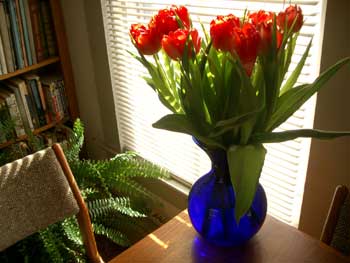
A cliche, I know, but they've been cheering me up all day and I wanted to share them.
4:26 PM
|
Some Girls Want Out is an article from the London Review of Books by Hilary Mantel about "spectacular female saintliness", but in particular about female saints who starved themselves.
In this long, troubling, sometimes creepy, and fascinating article, Mantel considers women portrayed in four books, The Voices of Gemma Galgani: The Life and Afterlife of a Modern Saint by Rudolph Bell and Cristina Mazzoni; Saint Thérèse of Lisieux by Kathryn Harrison; The Disease of Virgins: Green Sickness, Chlorosis and the Problems of Puberty by Helen King; and A Wonderful Little Girl: The True Story of Sarah Jacob, the Welsh Fasting Girl by Sian Busby.
"Starvation was a constant in these women's lives. It melted their flesh away, so that the beating of their hearts could be seen behind the racks of their ribs. It made them one with the poor and destitute, and united them with the image of Christ on the cross... Like her medieval predecessors, Gemma Galgani received the stigmata, the mark of Christ's wounds. Like them, she was beaten up by devils. Like them, she performed miracles of healing after her death. When you look at her strange life, you wonder what kind of language you can use to talk about her - through which discipline will you approach her?"
She tells of their lives, which are bizarre regardless of how you look at them, but then - and this is the truly fascinating part - considers "holy anorexia" in relationship to the anorexia epidemic of today -- what common factors might be at work? What options for control did these unusual women have, and why were they exercising them? Were these saints also trying to evade their sexuality and femininity? Why did the church find their actions so problematic, and why are we so profoundly disturbed by young anorexic women today while we allow young men to exert other kinds of destructive control over their bodies?
"Bell and Mazzoni demonstrate how potentially subversive Gemma's physical eloquence was. The saint first affected by the stigmata was Francis of Assisi, but it has afflicted many more women than men. It insists on the likeness of the believer's body to that of Christ. It argues that the gender of the redemptive body does not matter. It undermines the notion of a masculine God. It shows that Christ can represent women and women can represent Christ - no wonder it makes the church nervous. There is a trap the church has created for itself - it wants Jesus to have a gender but not sexuality. Under the loincloth of the crucified Christ, what would you find? Only a smooth groin of wood or plaster. His ability to love has to centre on some other organ..."
"Anorexia itself seems like mad behaviour, but I don't think it is madness. It is a way of shrinking back, of reserving, preserving the self, fighting free of sexual and emotional entanglements. It says, like Christ, 'noli me tangere.' Touch me not and take yourself off. For a year or two, it may be a valid strategy; to be greensick, to be out of the game; to die just a little; to nourish the inner being while starving the outer being; to buy time..."
Perhaps not before-dinner reading, but I'd love to hear what other people think. As for myself, I've never been able to fast very much, and never had any urge to, but I am very fond of a young woman who struggled with anorexia throughout her adolescence. I don't pretend to understand it; all I could do was catch glimpses of possible reasons, speculate privately, and try to let her know I loved her for the unique beauty and spirit that she seemed to despise in herself. I recently read a memoir by an Episcopal priest about her own anorexia, and it failed to explain much beyond the fact that this young woman, too, hated herself. Mantel's well-written article gave me a new perspective; she asks more questions than she answers, and gave me a lot to ponder about women, our bodies, and the offerings we choose to make of them.
4:18 PM
|
Tuesday, March 09, 2004
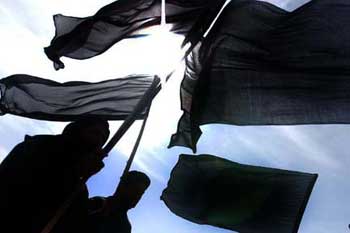
Ashura in Karbala.
Photographs by Ali Khaligh from Kargah.com (some of these are pretty bloody, so be forewarned).
To better understand what you're seeing in these photographs, read Nancy's vivid description of an Ashura observance, at under the fire star.
Thanks for all the thoughtful comments on politics and Cassandra. I never had any intention of radically changing this blog, and your feedback reinforces that, as well as my own hunches about what people like and don't like about this site. I sure do love you and your honesty. Thank God for opinions and people who aren't afraid to express them!
I've been on a cooking binge, trying to stock up the freezer for days when I/we don't have time. This afternoon I made a big pot of beef and celery khoresh, a Persian stew flavored with turmeric, dried lemon, fresh parsley (tons of parsley), tomato paste, chili, and dried mint. It's very good; you eat it on rice with yogurt. And I made a pot of spaghetti sauce. And a lot of jasmine rice. Whenever I dip my hand into my small container of dried lemon, with its dark brown, uneven, somewhat soft and pungent pieces, I wonder if these lemons were spread out in the sun or on a radiator somewhere, the way Shirin talks about. "We picked them from the trees in the courtyard," she told me, "and set them out to dry. And then you crack them with a hammer and break them into little pieces." The flavor they impart is entirely different from lemon juice - dusky, complex, and very sour.
A few other recommendations:
Maria's post on Martha Stewart, "Dust Bunny Blues", over at alembic.
Yesterday's Fresh Air interview with world religion scholar Karen Armstrong, about her new memoir, The Spiral Staircase. I've found Armstrong's books pretty dry, but this memoir of her life as a young nun and her dislocating re-entry into a world of Vietnam protest, hippies, and the Beatles sounds fascinating. As a young woman she was also diagnosed, after five distressing years, as having temporal lobe epilepsy, the same disease as Dostoyevsky - which can cause "religious" symptoms.
Neal Ascherson's riveting essay on Georgia (the one in the Caucasus), "After the Revolution", in The London Review of Books. Don't miss the part about the Dmanisi , tiny hominids who lived in what is now Georgia 1.7 million years ago.
Evan Maxwell's letter about journalism and blogging, from the LA Times (thanks, Marjorie!)
8:21 PM
|
Monday, March 08, 2004

GEORGE WASHINGTON BRIDGE (across the Hudson River, just north of Manhattan)
One of my favorite structures, both because I think it's beautiful and because seeing it means you're almost there.
5:28 PM
|
POLITICS OR NOT?
I'm curious - how do people feel about political discussions on this blog? (I know, it's my blog, but you are my guests, and we're into radical hospitality, remember?) I have no intention of making this a political blog, for reasons I've stated before, but occasionally there is something that I feel I want to say, or a pertinent link to share, especially when it has to do with the other topics that we frequently focus on here, such as religious pluralism or world culture. Some people have felt the need to apologize to me for making heated (well, not even heated!) remarks in the comment threads. You know, it doesn't bother me at all. If you were all here in person, we'd argue about all those taboo topics: religion, sex, and politics - but I doubt if we'd come to blows. Especially because the readership of this blog is quite diverse, I gratefully encourage and welcome all of your views, and all I ask is that people be respectful of one another, as you almost always are.
But how do you feel about the topic in general? As I told one commenter, I started this blog in reaction to my own burn-out after two years of intense political and peace work, especially regarding the Middle East. I purposely want people to come to The Cassandra Pages and find something that makes them feel better, not worse, and to discover kindred spirits who still believe there is value and hope in thinking, and art, and compassion for one another. On the other hand, I think we all are trying to grapple with today's world and trying to gain understanding and help each other through a very difficult time. So how do you feel about politics - do you want to see it here or not?
5:25 PM
|
Sunday, March 07, 2004
It's been a long weekend. Friday night we curled up in bed and watched "Frida". Saturday, my usual housework day, I did everything I could: cleaned the bathroom, did the laundry and ironing, tidied up the living area and then spent most of the afternoon in the kitchen, making some food for the week ahead (some aromatic chinese beef spiced with star anise) and the meal for that night's dinner with three of our Muslim friends - salmon with a crushed cumin/coriander seed crust and spicy citrus salsa; a pilaf of kasha, onion, carrot and orzo; green salad; French bread; Arabic pastries from Montreal and Iranian ones that Shirin brought from Los Angeles, along with strawberries for dessert. J. made his mother's famous sambusek, deep-fried pastries filled with cheese, scallions, and parsley. The guests stayed until nearly midnight discussing Iranian politics, the Iraqi constitution, various Shii and Sunni beliefs about jinn, the spirits who gave rise to the term "genie", and telling hilarious jokes from Iran and Morocco. We also got into an intense discussion about Mel Gibson's "Passion" (which none of us had seen yet) and issues of language and authenticity in the Bible and in Muslim hadiths; at one point we had four different reference sources arrayed on the table along with the dessert as we looked for parallel passages in Luke and Matthew.
Shirin, who loves to laugh and tell stories, told about how one time when she had a cast on her arm she woke in the night and it itched so much she thought a jinn had gotten hold of her. She tried to pray, but found she couldn't say the name of Allah - it was like "the jinn had stopped up my mouth". She got really scared; they were living in a house surrounded by woods at the time, and jinn are supposed to live in the woods. Finally she remembered a sequence of chanted prayers that led up to the name of God again and that time she managed to get it out - and she said whatever was holding her tongue let go, and she was all right. "If it hadn't let go I would have gone crazy and I was worrying even then that my husband would put me in a home for insane people. See, I never would have met you!" she said to me, tragically. "What would you have done?" she said, laughing, turning to her husband.
"Kashke kashtan sabz nashod", he replied. "It's a Farsi saying, translated loosely as "I planted an 'if', and it didn't bloom."
Today - church and choir beginning at nine, then a drive to Concord for the formal investiture of Gene Robinson as the Diocesan Bishop of New Hampshire, taking over from the retiring Bishop Theuner. It was a very happy occasion, more of a family" affair for the diocese itself than the consecration was, with much less pomp, fewer media and security forces, and more personality - but by the time we got home, we were both very tired indeed. I'm hoping for a happier and more restful week to come.
10:10 PM
|
Saturday, March 06, 2004
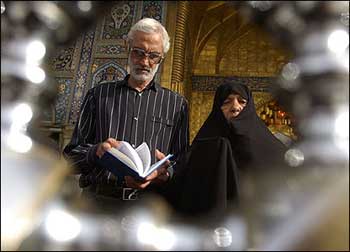
A photo journal following two Iranian Shiia pilgrims during their stay in Karbala, Iraq, from the BBC. Karbala is second only to Mecca in holiness to Shiia Muslims. This couple had gone there for Ashoura, the commemoration of the death of Imam Hussein in 680, a grandson of Prophet Mohammed. (Hussein's tomb is in Karbala.)
I came to Karbala six months ago, at the first opportunity after the war, with my two sons," Mohsen said.
"That time we crossed the border illegally, walking eight hours across mountains, guided by people smugglers.
"This time we travelled here more comfortably by bus. The border is open to Iranian pilgrims during Ashoura. You don't even need to show your passport."
4:45 PM
|
Friday, March 05, 2004
The Middle East and Kerry
From Al-Ahram Weekly (Cairo) an analysis of the difference (little) a Kerry presidency would make in the Middle East:
Kerry asserts that, "history and our own best interests demand that the United States maintain a steady policy of friendship and support for Israel." In December, he lambasted former front- runner Vermont Governor Howard Dean for proposing that the US adopt an "even-handed" approach to the Israeli-Palestinian conflict. Tellingly, Kerry said that, "Every candidate who aspires to be president should know that Israel is a democracy and our closest ally in the region."
For Kerry, the burden of renewing stalled peace talks does not rest on Ariel Sharon, who "is willing to make peace" but does not "see a committed partner in peace on the Palestinian side". He believes, instead, that the violence is triggered by "militant Palestinian groups bent on destroying the peace process," rather than by Israeli actions in the West Bank and Gaza.
With this understanding of a cycle of Arab aggression and Israeli self-defence, it is only natural that Kerry insists that "Palestinians must stop the violence -- this is the fundamental building block of the peace process." After this step, Israel should "alleviate hardships on the Palestinian people", a move which evidently does not involve dismantling the separation wall or the vast majority of settlements.
Chernobyl
From Conscientious, a remarkable, raw tour of Chernobyl today by a Kawasaki-riding young Russian woman whose attitude toward risk is as worth reflecting upon as the images she shows us. (Be sure to keep clicking "next" at the bottom of each page.)
The word CHERNOBYL scares holly bijesus out of people here. If I tell someone that I am heading in "dead zone"... you know, what I hear.. In best case- "are you nuts?" My dad used to say that people afraid of a things which they don't know. Dad is nuclear physicist and he also says that of all dangerous things he can only think about one, which is riding on fifth or sixth gear on my bike. In any way, dad and their team work in "dead zone" for last 18 years. They doing researches from the day when nuclear disaster happened. The rest of guys in a team are microbiologists, doctors, botanists.. etc. I was 7 years old back then...
5:10 PM
|

GRAND CENTRAL STATION, from the outside
Well, it had to happen eventually - I kind of crashed yesterday. This has been such a stressful and hectic period, and yesterday the tiredness and disappointment and anger all added up to a miserable afternoon, and a non-restful night. Arrayed around the edges of my consciousness was a jeering line-up of doubt-devils, taunting me with "You'll never write a book without that deadline!" "It's too late for this subject anyway!" and "Nobody else will want to publish it!" Today, however, I feel like I'm getting back on track, and realizing that one way or another, I'll find the right project and the right focus. In fact this morning I thought, wryly, how good it was that none of those pitchfork-jabbing comments had been "Ha,ha, and guess what? Your writing is no good!" Progress! I think I've vaporized that one.
Nobody's mood is being helped up here by the weather, which is uniformly grey, drizzly, and clammy-cold. It's just about the ugliest time of year too, with the mud, road sand on the rotting snowbanks, splashing mud puddles, and a winter's worth of debris emerging from underneath the snow. March is a season of enduring, and of hopes raised and dashed and raised again.
But realizing that I suddenly have the prospect of some TIME is quite astounding. Last night I went to choir rehearsal for the first time in three weeks and started catching up on a folder-full of new music, including a Bach cantata we're performing at Evensong at the end of March. I also not only stepped foot in my studio, but did a pile of ironing that had accumulated in there, dusted off my bookpress and sewing-frame, and began work on a small handbound book. I've been playing the piano - Bach and Mendelssohn - a little every night this week, and knitting an inch or two on my grass-green Gansey, now almost two years in the making. I know I won't keep all these activities up, but right now they are absolutely restorative. And tomorrow I intend to get back to writing about something other than myself!
3:10 PM
|
Wednesday, March 03, 2004

GRAND CENTRAL
I took far too many pictures in New York; in a day or two I'll post some to the photoblog part of this site. I hadn't been in Grand Central Station for a long time; it was shiny, squeaky clean with newly-added (I think) gigantic American flags. For those who haven't seen the many movie scenes shot here or had their own romantic encounters, "meeting by the clock in Grand Central" - that's it, in the center - evokes memories of a lot of leaping and crushed hearts. Overhead is a big dome painted with the constellations. And the Oyster Bar was on strike.

EAST 42nd STREET
That's the Chrysler Building rising above the reflective surfaces of other skyscrapers on East 42nd Street as we headed out of the city. At the end of this street is the East River, and the United Nations Plaza.
8:16 PM
|
Why, oh why, didn't I take my camera with me to the polls yesterday? We went to vote around suppertime. In our town, voting is held in the high school gym, which you approach along a sidewalk lined with candidates and their spouses and friends, holding handmade posters and coffee cups, trying to keep warm. Yesterday was a pretty nice day here, so the dozen or so campaigners weren't bundled up beyond recognition, and we shook hands and greeted neighbors on our way into the polls.
The school gym is a typical one with bright fluorescent lights, a hardwood floor, and blue-and-white banners for each year's basketball teams hung on the walls. It smells of sweat and wrestling mats. The bleachers were folded up, and the voting booths set up in a long line against one wall, side by side, rickety aluminum legs holding the shelf inside, and faded red-white-and-blue vertically striped curtains, hip-length, on a rod at the top of each booth. The voter checklists were arrayed on tall, slanted plywood display boards, and members of the Board of Civil Authority were stationed at several strategic places in the alphabet, ready to check us off. (This voter checklist is the only official place where my last name is the same as my husband's - why, I can't remember.) "Democratic or Republican ballot?" they asked, after making a pencil mark next to our names. "Democratic," we replied, and went to the table where we were handed three ballots - a lavender one for the presidential primary, orange for local elections, and tan for the school board. Most of the local contests had only one candidate listed for each office; for "lister" - the folks who determine the assessed value of each house for the town's grand list - there were no candidates at all, just a write-in space. One of our neighbors was running - passing out blue cards with his name on it in the gauntlet outside the gym - so we wrote him in.
When I came out of my booth there was a long line of voters waiting to feed their ballots into the electronic vote-counting machine. A young woman, holding her little girl by the hand, took the place in back of me in line. "What are we doing, Mommy?" the daughter asked.
"We're taking our ballots and waiting in this line so that we can put them in the machine."
"What's a ballot?"
It looked like a pretty good turnout. I always like seeing who shows up; there were quite a few people we know, including old-timers coming out of the woodwork, and many we don't. The woman in front of me, in a cabled handknit sweater, was talking about her woodstove, and how if she were single she didn't think she'd have one. In front of her was a young man in a Harley-Davidson motorcycle jacket and a black kerchief, carefully arranging his ballots.
As we left the gym an elderly friend came in from outdoors. "Clyde is running out of cards," she said. "Are there any more lying around in here?"
"There were some in this garbage barrel," I told her, not admitting that was where I had put mine. "Here, let me scrounge for some." I bent over and riffled through the contents of the big trash barrel, near a table where young girls were selling Girl Scout cookies. I pulled out all the blue cards I could find while J. looked on, amused.
"Here," I said, handing her a handful of cards.
"Great!" she said, with a big smile. "That will hold us for a while."
9:09 AM
|
Monday, March 01, 2004
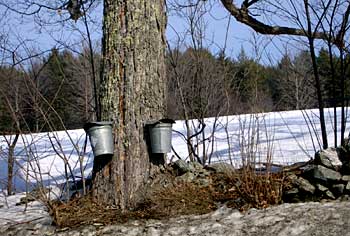
WHAT I SAW TODAY
Out for a drive, midday; nearly 50 degrees here. These were the first sap buckets I've seen this year, hanging on some old maples near the road, with a russet-colored farm horse nearby, staring at me. I also had my first mud-driving of the year, when I started up a dirt road and wisely turned around before I couldn't. No one who hasn't experienced "mud season" can imagine it: frozen roads turning to mud, sometimes a foot or more deep, with ruts that freeze overnight and thaw to create mires that one can only navigate by getting a fast running start and hoping for the best.
Half of me is still in the city; this juxtaposition is pretty extreme. On Sunday afternoon we walked down the street to the congregational church parish hall, where there was a retirement party for our postmaster, a woman we've known for years. It was real small-town Americana: fifty people sitting uncomfortably on chairs around the edges of the room, awkward and funny speeches, a surprising poem from a shy woman, a spontaneous song, a tribute by the guest who had flown in all the way from Wisconsin, the red-white-and-blue crepe paper decorations, the little American flags on the tables, the sheet cake - half cake and half icing -made by a local person in the form of a big letter with stamps and address and cancellation, the church ladies patiently waiting in the kitchen doorway for the speeches to be finished so they could pour the coffee. It was good to be reminded that people can be simple and sincere.
I'm tired. But it has been good to have a little time to knit and play the piano. Last night I played through Bach's First Partita, not particularly well but enjoyably, and tonight played partway through the Second. My fingers feel stiff and my technique, such as it is, is rusty, but the feeling and the pleasure are there. I wonder why I go so far away from music sometimes, when every day has fifteen minutes that could be devoted to the oasis that it creates, but music itself contains the answer: it is the silences between notes that make music come alive.
10:44 PM
|
|
|